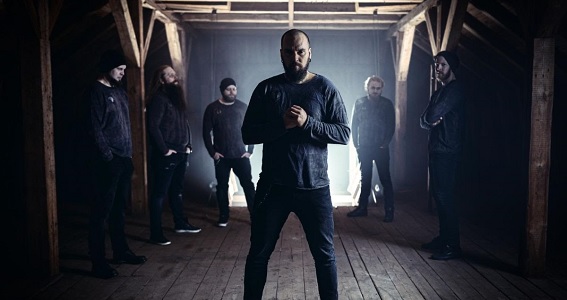Photo Credits: Miikka Järvinen
---SCROLL DOWN FOR THE ENGLISH VERSION---
Ciao ragazzi e benvenuti su SpazioRock! Come va? Il vostro nuovo album "Fata Morgana" è uscito da poco, come vi sentite a riguardo?
Nico: Siamo veramente felici e emozionati. A parte la brutta situazione in cui ci troviamo, questo è stato, per noi, un anno interessante e pieno di lavoro.
Jaakko: A questo punto ci si sente allo stesso momento sollevato, ma anche un po' triste. È stato un percorso lungo e davvero soddisfacente.
"Fata Morgana" è il vostro terzo album in studio e continua a sviluppare le splendide atmosfere dei vostri precedenti lavori: un freddo mistico va a mescolarsi omogeneamente ad un forte senso di malinconia e di tristezza metaforica. Il paesaggio idealistico che descrivete con la vostra musica è assolutamente travolgente e permette all'ascoltatore di immergere la mente al suo interno. Quanto tempo impiegate a metter su una canzone, considerando il notevole wall of sound che riuscite ad ergere in ogni traccia? Qual è il vostro solito processo di scrittura?
Nico: Solitamente iniziamo con un demo piuttosto grezzo fatto da me, da Harri, l'altro nostro chitarrista oppure da Niko, il nostro bassista. Cerchiamo di convogliare un'idea in una forma "suonabile" e dopo ciò iniziamo a jammare con la band. Il songwriting, nel nostro caso, è un processo assolutamente democratico. Solitamente da lì le tracce vengono interrote e ricostruite di nuovo per qualche altra volta. Ognuno di noi partecipa e continuiamo insistentemente fino a quando tutti rimangono soddisfatti. Prima di entrare in studio effettuiamo un ritiro per la produzione con il nostro producer, dove finalizziamo le canzoni e ci sono altre sessioni di rottura e ricomposizione fino a quando non sono definitivamente pronte. Credo che il processo di scrittura per questo album sia durato all'incirca un anno.
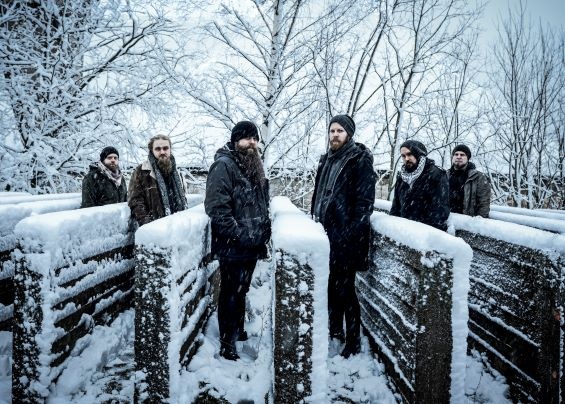
Trovo il vostro stile musicale veramente speciale: siete capaci di mixare la pesantezza sonora del doom/death con un pattern melodico molto ricercato. In alcune parti siete arrivati a collegare brillantemente screams brutali con sezioni di chitarre pulite. Da dove deriva questo particolare mix? Come siete riusciti a unire questi elementi?
Nico: Per prima cosa, ti ringrazio! Credo sia qualcosa di subconscio. Cerchiamo di non pensare troppo agli elementi in gioco. Proviamo realmente a lasciar sviluppare da sole le canzoni e a fare qualsiasi cosa sembri calzare a pennello con quella particolare atmosfera. Il fatto che ognuno di noi partecipi nella costruzione dei pezzi potrebbe essere il fattore che conferisce loro qualcosa di unico, qualcosa che non si può proprio attaccare in alcun modo.
Jaakko: Credo che noi proviamo veementemente a metter su un'atmosfera in ogni modo possibile. Questo, a volte, può voler dire abbandonare le linee di genere e non rimuginarci troppo. E siamo bravi a non pensare.
La storia di "Fata Morgana" è molto interessante: essa richiama la mitologia celtica e descrive un particolare effetto ottico che incantava i marinai durante le loro rotte, visioni splendide ed ingannevoli che li portava alla morte. Il tema dell'illusione è preponderante, specialmente nella title track: credo che "Fata Morgana" non sia solo un semplice effetto ottico, ma potremmo considerarlo come il semplice ologramma della fine della vita. Cerchiamo perennemente una felicità ideale, la vediamo dalla distanza, ma quando ne siamo vicini, le ali della morte ci trascinano nell'abisso. Cosa significa, per voi, "Fata Morgana"? E perchè avete deciso di costruire un intero abum attorno a questa storia?
Jaakko: Ottima analisi! Mi piace molto. Cerchiamo di lasciare spazio agli ascoltatori per permettere loro di trovare il loro punto di vista nei pezzi, credo non ci sia altro modo di pensarci. Interpretiamo "Fata Morgana" come una distorsione della vista che non è, però, visibile alle persone che ne sono affette. Questo può portarti a pensare di poter vedere chiaramente quando invece vivi nella tua realtà personale e la distorsione attanaglia ogni giudizio che emetti. In questo album abbiamo continuato la storia iniziata con il nostro primo disco. Parla di un uomo che perde la sua casa ed inizia a costruire delle mura per proteggersi. Finisce, poi, per cedere nel secondo album e in questo ultimo full length cerca di raccogliere i pezzi rimasti della sua vita precedente. Per fare ciò, egli inizia un lungo viaggio attraversando gli angoli del mondo fino ad un luogo estremamente ostico. L'abbiamo immaginato come una specie di Antartide. Durante la rotta cerca di capire quale potesse essere la causa della sua caduta ed infine si rende conto che il freddo del pianeta aveva completamente distorto la sua vista. Questa era la storia, ma, come ho già detto, è veramente gratificante sentire le diverse interpretazioni degli altri. E, ovviamente, la situazione pandemica ha dato al tutto un grosso scossone.
Ho apprezzato molto la fredda atmosfera che avete descritto durante l'intero disco: il bianco ghiaccato della neve, ma anche la gelida anima della distanza tra le persone. Per sette tracce ci immergiamo in questo scenario desolato, ma con "South Of Vostok", l'ultimo pezzo, viene introdotto il tema del fuoco e questo inizia a bruciare l'aria come una piccola fiammella di speranza. Come spiegate questo contrasto? C'è un significato particolare dietro questi elementi?
Jaakko: È la fine e, magari, un nuovo inizio. In mezzo a tutto questo freddo, il protagonista tenta ancora di trovare forza e qualcosa di nuovo in sé stesso. Vostok è una stazione di ricerca russa in Antartide circondata tutt'intorno da un lago. Ci sono chilometri di ghiaccio tra il lago e la superficie. C'è ancora vita da qualche parte nel profondo. Dobbiamo solo scovarla.
Jaakko, la tua voce multiforme in questo album è assolutamente spiazzante: troviamo sezioni pulite, quasi sussurrate, seguite da screams brutali e strazianti. Come avete sviluppato questo equilibrio tra melodia e pesantezza?
Jaakko: Abbiamo provato a trovare il giusto approccio ad ogni canzone ed in ogni sua parte. Il nostro produttore, Teemu Aalto, è stato di grande aiuto nel farci capire questo tipo di cose. Il principale obiettivo è entrare nel mood giusto. A volte è piuttosto semplice, a volte dobbiamo pensarci molto. Per esempio, "Fata Morgana" è stata pensata in growl in un primo momento, ma non sembrava la soluzione adatta. Quindi abbiamo abbandonato quell'idea e abbiamo provato in un modo diverso, usando questi screams più disperati. Credo che abbiamo preso la decisione migliore. È la canzone più personale per me ed è importante che le linee vocali la rappresentino al meglio.
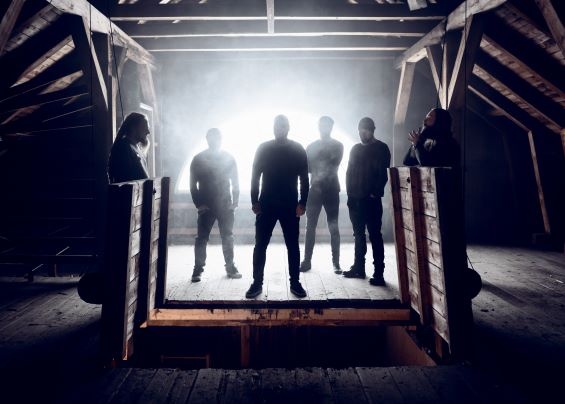
Siamo in un periodo orribile per i live shows. Il mondo dei teatri, locali per concerti e festival è stato messo in ginocchio dalla pandemia e tutti i musicisti non possono suonare live le loro nuove uscite davanti ai fan. Questo deve essere veramente frustrante per voi. Avete qualcosa in mente per promuovere "Fata Morgana" durante questo periodo complicato?
Nico: Sì, è difficile. Solitamente quando pubblichi un album, riesci a tenerlo a galla attraverso i tour. In questi giorni una nuova uscita diventa quasi irrilevante in poco tempo, essendo i social media gli unici strumenti di promozione. Ma abbiamo qualcosa in fermento. Proveremo a darvi una sorta di esperienza live a breve.
Siete una band giovane: avete iniziato la vostra carriera nel 2013 e avete ancora molta strada da percorrere. Provate a proiettarvi con la mente al futuro: dove vorreste essere tra dieci anni?
Nico: Su un bus, con la puzza di piedi, correndo in giro per tutto il mondo a far conoscere la nostra musica alle persone.
Jaakko: Sudato e stanco dopo un bello show da qualche parte lontano da qui.
Grazie per il vostro tempo ragazzi. Vi faccio i migliori auguri, sperando di vedervi in Italia durante tempi migliori! Volete lasciare un messaggio in particolare ai nostri lettori e a tutti i vostri fans italiani? Buona giornata!
Nico e Jaakko: Siate forti! Questa pandemia finirà presto e ci vedremo ai festival e nei club, a bere birra e condividere battute di cattivo gusto!
---ENGLISH VERSION---
Hi guys and welcome to SpazioRock! How is it going? How do you feel about your new album "Fata Morgana"? We're really close to the release date!
Nico: Very happy and very excited. Despite the situation this has been an interesting and work filled year so far.
Jaakko: At this point you feel relieved and maybe a bit sad at the same time. This has been a long and a very satisfying project.
"Fata Morgana" is your third studio album and it keeps developing the great atmospheres of your previous releases: a mystic cold is homogeneously mixed to a strong sense of melancholy and metaphorical sadness. The ideal landscape that you describe with your music is absolutely amazing and allows the listener to dip his mind into it. How long does it take to you to build up a song, considering the great wall of sound you raise with every track? What is your usual writing process?
Nico: Usually we start with a rough demo made by me, our other guitar player Harri or our bass player Niko. We try to get the idea into a playable form and after that start jamming with the band. The songwriting in our band is a very democratic process. Usually from there the songs get broken up and built again a few times. Everyone pitches in and we grind on it until all of the guys are satisfied. Before the studio we have a production camp with our producer where we finalize the songs. Some more breaking and composing until they are "studio ready". I think the writing process for this album took about a year or so.
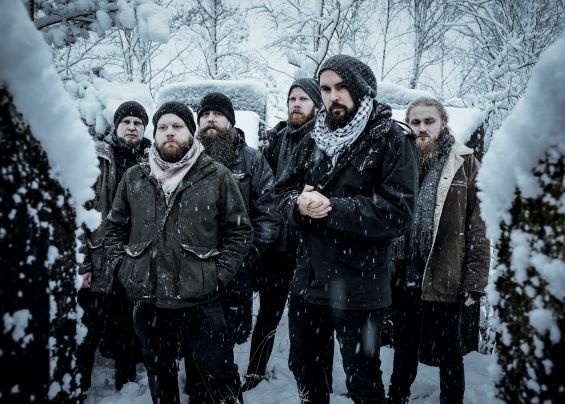
I find your style really special: you are able to mix the heaviness of doom/death with a researched melodic pattern. In some parts you managed to connect brutal screams to clean guitar sections in a beautiful way. Where does this mix come from? How did you bring it together?
Nico: First of all, thank you! I guess it is just something subconscious. We try to not think about the elements too much. We really just try to let the songs develop by themselves and do whatever feels right for that particular atmosphere. The fact that we all participate in making the songs may be the factor that gives them something unique, something you really can't point with your finger at.
Jaakko: I guess we just try to build as strong an atmosphere as we can, by whatever means possible. That sometimes means ditching the genre lines and not thinking too much. And we are good at not thinking.
The story of "Fata Morgana" is really interesting: it recalls the Celtic mythology and describes a particular optic effect that enchanted the sailors during their sea trips, beautiful and tricky visions that brought them to death. The theme of illusion is strong, especially in the title track: I think that "Fata Morgana" is not only an optic effect, but we can consider it as the simple hologram of the end of life. We constantly look for the ideal happiness, we see it from the distance, but when we're
close to it, the wings of death come to take us into the abyss. What is "Fata Morgana" to you? And why did you built an entire album on this very story?
Jaakko: A very good analysis! Really like it. We try to leave room for listeners to find their own angle into the songs and I think there are no ways to think at it. We saw Fata Morgana as a distortion in vision that is not visible to the people suffering from it. It can cause you to think you see clearly when actually you are living in your own reality and the distortion is affecting every judgement you do. On this album we continued a story that began on our first album. It is about a man who loses his place and begins to build walls to protect himself. Eventually he collapses on the second album and on Fata Morgana he tries to pick up the pieces left of his former life. In order to do so he takes a long journey towards the edges of the world to an extremely hostile place. We envisioned something like Antarctica. Along the way he tries to figure out what was the cause of his downfall and eventually he figures out that the cold of the world had distorted his vision. That was the story behind it but as I said, it is really fulfilling to hear how other people see it. And of course this whole covid thing has given it a completely new spin.
I loved the cold atmosphere you described on the entire plot: the iced white of the snow, but also the frozen soul of the distance between people. For seven tracks we dive into this desolate landscape but with "South Of Vostok", the last song, the theme of fire is introduced and burns the air we breathe like a small flame of hope. How do you explain this contrast? Is there some sort of particular significance behind these elements?
Jaakko: It is the end and maybe a new beginning. Amidst all that cold the main character still manages to find strength and something new from himself. Vostok is a Russian research station in Antarctica that has a lake underneath it. There is kilometers of ice between the surface and the lake. Still there is still life somewhere deep. We just need to find it.
Jaakko Mäntymaa's multiform vocals are gorgeous in this album: we can find whispered clean sections followed by brutal and heartbreaking screams. How did you develop this balance between hardness and softness?
Jaakko: We just tried to find the right approach to every song and part of a song. Our producer Teemu Aalto is a great help when figuring these sorts of things out. The main goal is to get the right mood. Sometimes it comes easily and sometimes it needs a whole lot of thinking. On some songs we tried a lot of different ways. For instance "Fata Morgana" was made with growling at first but it didn't feel right. Then we ditched that idea and went a different way with these more desperate screams. I think we made the right decision. It is the most personal song for me and it is important that the vocals represent that as well.
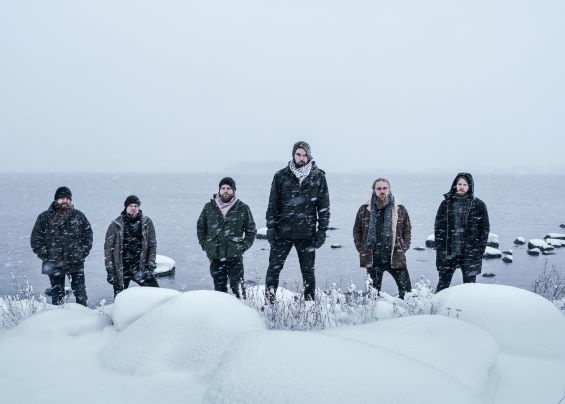
We are in a horrible time for live shows. The world of theaters, concert venues and festivals has been destroyed by the pandemic and all the musicians are unable to bring on stage their new releases. This must be really frustrating for you. Do you have something in mind to promote "Fata Morgana" during these hard times?
Nico: Well yes it is difficult. Normally when you release an album you are able to keep it float by touring. These days the album comes irrelevant within days since social media is pretty much the only place to promote it. But we have something brewing. We will try to give you some sort of a live experience in the near future.
You are a young band: you started your career in 2013 and you have got a long way to go. Take a look at your future: where do you want to be in 10 years?
Nico: In a bus smelling like foot odor speeding through the globe blasting our music to the people.
Jaakko: Sweaty and tired after a good show somewhere far from here.
Thank you for your time guys. Best wishes to you, hoping to see you in Italy in better times! Would you like to leave a special message to our readers and to all our fans here in Italy? Have a good day!
The boys: Stay strong! This pandemic will blow over and we will see each other at festivals and clubs, have some beers and share the latest on the bad joke department!

